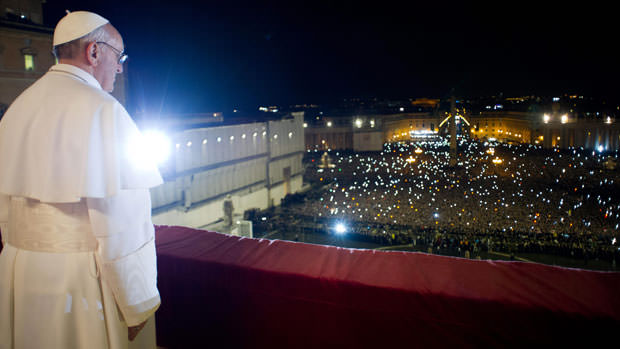White Smoke Confirms the New Pope’s Election
Newly elected Pope Francis I is sworn in
By Melissa Goertzen
Thousands cheered in St. Peter’s Square on Wednesday evening as white smoke signalled the election of the 226th pope.
In less than 24 hours, Pope Francis I has succeeded in charming the world with displays of humility and simplicity. Early this morning, the former archbishop of Buenos Aires, Cardinal Jorge Bergoglio, stopped by a Vatican-owned residence to pick up his luggage and offered to pay his bill. Reports say that he shunned transport in the papal car so he could ride on the bus with other cardinals.
The 76-year-old pontiff was chosen on the fifth ballot to replace the Pope Benedict XVI, the first pope to resign in 600 years. This was an unusually quick conclave and in the past century, only Benedict, John Paul I and Pius XII were elected faster.
Francis is also the first non-European pope elected since 741 AD. “It seems as if my brother cardinals went to find [a bishop of Rome] from the end of the earth, but here we are. Thank you for the welcome,” he said.
A Shift towards Diversity and Simplicity
Crowds cheered and drivers honked their horns in the streets of Buenos Aires when the election results were announced. Over 40 per cent of the world’s Catholics live in Latin America, and for years, that population has been underrepresented in church leadership.
CBC News spoke with Jose Antonio Cruz, a Franciscan friar at the St. Francis of Assisi in Puerto Rico, about public reaction to the news. “It’s a huge gift for all of Latin America. We waited 20 centuries. It was worth the wait,” he said.
In Canada, the Catholic community reacted with excitement, hope, and optimism about the future of the church. The election demonstrates that the Catholic Church is reflecting on its global diversity. Rev. Michael Miller, archbishop of Vancouver, told CTV News that this election marks an important milestone in the history of the church. “I think it sort of reminds the world the church is universal, the church is not just European,” he said.
Francis brings more to the Vatican than cultural and geographic diversity; he brings a common touch. For years, he denied luxuries common to most church leaders, opting to use public transportation, prepare his own meals, and live in a modest apartment.
The focus of the pontiff’s work is on social outreach and service. These values are embodied in the name Francis, which he chose as tribute to the beloved Catholic saint Francis of Assisi, founder of the Franciscan Order of Friars in 1290. The central mandate of the order is to renounce wealth, live in poverty, and serve the poor.
Rev. Thomas Reese, author of Inside the Vatican, said that an emphasis on simplicity could serve as a shock to residents of Vatican City. “If he brings that same desire for a simple lifestyle to the papal courts, I think they are all going to be in shock. This may not be a man who wants to wear silk and furs.” Francis may have succeeded Benedict as the bishop of Rome, but it seems unlikely that he will continue the former-pope’s legacy as accessorizer of the year.
The Future Direction of the Catholic Church
Francis is already viewed as a reformer who may help modernize the church and build bridges with leaders of other religions.
CTV News spoke with Syed Soharwardy of the Islamic Supreme Council of Canada, and he believes that Francis will focus on commonalities instead of differences. “I think Pope Francis will help Christians and Muslims and people of all other faiths to come together and have a peace and harmony and his direction will help all of us,” he said.
























Share the post "White Smoke Confirms the New Pope’s Election"